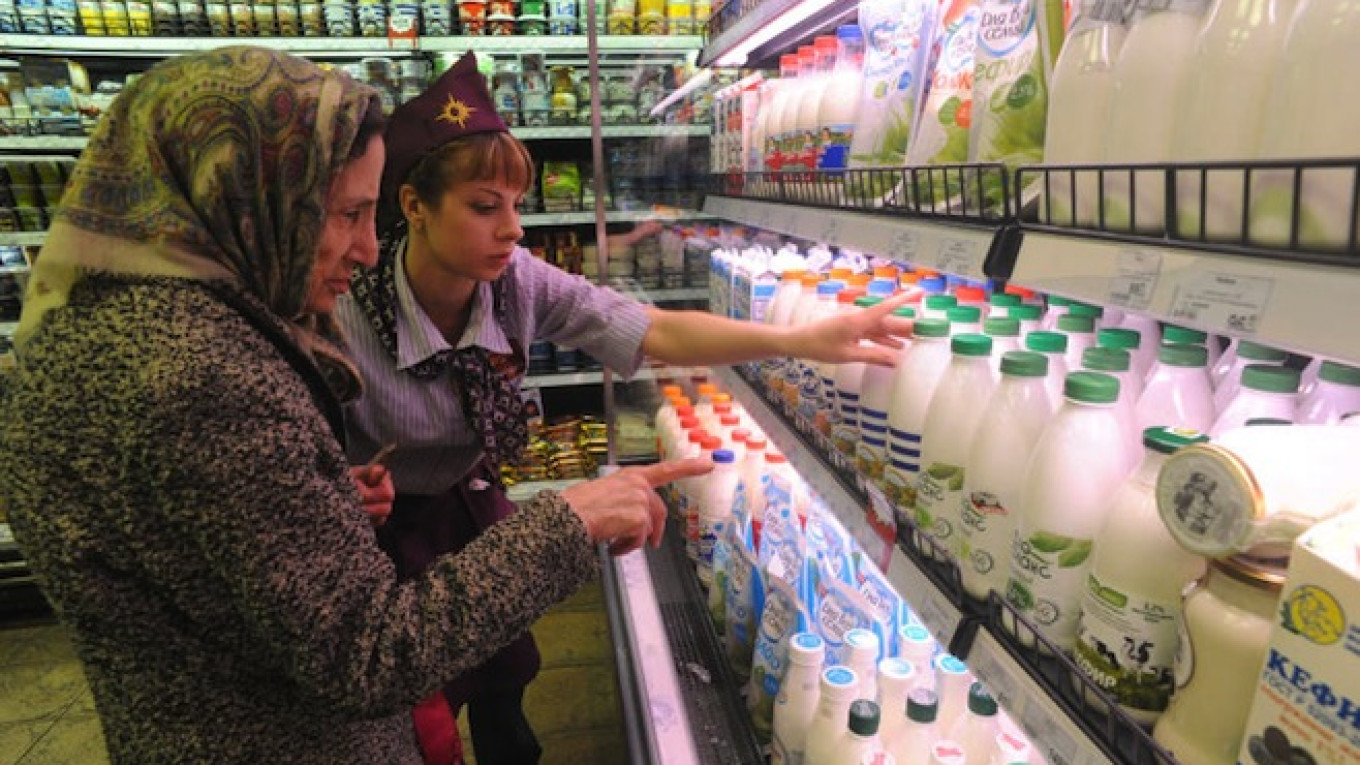Moscow imposed a total ban on imports of many Western foods on Thursday in retaliation against sanctions over Ukraine, a stronger than expected measure that isolates Russian consumers from world trade to a degree unseen since Soviet days.
Russian share prices fell after the announcement of Moscow's one-year ban on all meat, fish, dairy, fruit and vegetables from the U.S., the 28 EU countries, Canada, Australia and non-EU member Norway.
Russia bought $43 billion worth of food last year. It has become by far the biggest consumer of EU fruit and vegetables, the second biggest buyer of U.S. poultry and a major global consumer of fish, meat and dairy.
President Vladimir Putin ordered his government on Wednesday to adopt the measures to retaliate against Western countries who imposed sanctions on Russia's defense, oil and financial sectors over its support for rebels waging an insurrection in east Ukraine.
He had promised to ensure that the measures would not hurt Russian consumers, which suggested he might exclude some popular products. But in the end, the bans announced by his prime minister, Dmitry Medvedev, mentioned no exceptions.
The announcement saw Russian bond yields rise to their highest levels in years and Moscow's already reeling share prices extend a sell-off.
Agriculture Minister Nikolai Fyodorov acknowledged that the measures would cause a short-term spike in inflation, but said he did not see a danger in the medium or long term. He said Russia would compensate with more imports of products from other suppliers such as Brazilian meat and New Zealand cheese.
The EU's executive commission said it reserved the right to take action to retaliate against the Russian ban.
Farmers in specific sectors in Western producing countries are likely to suffer, but much of the pain will be borne by Russians, who will face higher prices and shortages of some goods, with inflation already rising, the ruble falling and the economy hurt by capital flight.
"The first casualties would be the domestic market. However, it will have some implications for the farmers in the producing countries," Abdolreza Abbassian, a senior economist with the United Nations Food and Agriculture Organization, said.
Russians have relished imported food since the fall of the Soviet Union, when year-round supplies of fresh fruit and vegetables arrived and ubiquitous cheap American frozen chicken quarters became known as "Bush's legs" after the then-president.
The nascent middle class in Moscow, which buys Italian cheese and American beef at supermarkets, will take a hit, but so will ordinary people who buy Polish apples and Greek cucumbers in street markets. Russia bought 28 percent of EU fruit exports and 21.5 percent of its vegetables in 2011. It bought 8 percent of U.S. chicken meat exports last year.
Tit-for-Tat
Moscow may also ban Western airlines from flying transit routes over its air space, a measure that would cost European airlines money by burning extra fuel to avoid Russia on flights to Asia, but would also deprive Moscow of hundreds of millions of dollars in overflight fees.
Western countries imposed initially mild sanctions on Russia after it annexed Ukraine's Crimea peninsula in March, but tightened them after a Malaysian airliner was shot down over pro-Russian rebel-held territory in east Ukraine on July 17.
The latest Western measures limit access by Russian state banks to global capital markets and also block imports of defense and oil industry equipment.
Washington and Brussels say the Malaysian airliner was almost certainly shot down by an advanced anti-aircraft missile system supplied to the rebels by Russia. Moscow denies this.
The disaster galvanized politicians, particularly in Europe, who had previously been reluctant to take strong action against a big trading partner.
Dutch inspectors are trying to examine the site to investigate the cause of the disaster and recover any remains of the personal effects and bodies of the 298 victims of the crash. Their visit has been hampered by fighting in the area, which is near the road linking the two main rebel bastions Donetsk and Luhansk near the Russian frontier.
Kiev said it would lift a ceasefire imposed in the area as long as the Dutch had halted their work. Ukrainian military spokesman Andriy Lysenko said seven more Ukrainian service members had been killed in the past day of fighting.
See also:
Russia to Ban All U.S. Food Imports and EU Fruit and Veg, State Media Says
A Message from The Moscow Times:
Dear readers,
We are facing unprecedented challenges. Russia's Prosecutor General's Office has designated The Moscow Times as an "undesirable" organization, criminalizing our work and putting our staff at risk of prosecution. This follows our earlier unjust labeling as a "foreign agent."
These actions are direct attempts to silence independent journalism in Russia. The authorities claim our work "discredits the decisions of the Russian leadership." We see things differently: we strive to provide accurate, unbiased reporting on Russia.
We, the journalists of The Moscow Times, refuse to be silenced. But to continue our work, we need your help.
Your support, no matter how small, makes a world of difference. If you can, please support us monthly starting from just $2. It's quick to set up, and every contribution makes a significant impact.
By supporting The Moscow Times, you're defending open, independent journalism in the face of repression. Thank you for standing with us.
Remind me later.


